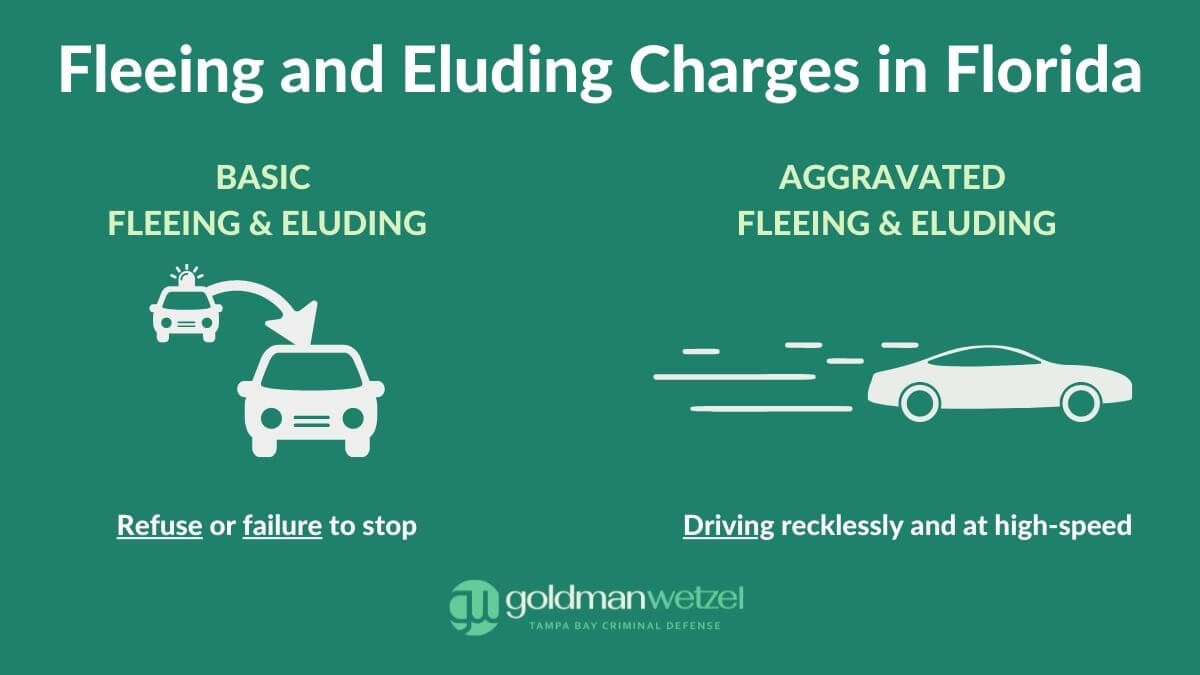Being stopped by the police can be overwhelming and frightening. Despite how stressful this situation can be, it is in your best interest to pull over. Failing to stop when directed by a police officer can result in a fleeing and eluding charge in Florida.
Even though it may not seem like a severe event, fleeing and eluding a law enforcement officer is a serious criminal offense. The following sections contain essential information to help you understand these charges and the consequences associated with them better.
If you or a family member have been charged with fleeing and eluding in Florida, you should seek legal representation as soon as possible. Call (727) 828-3900 today to schedule a free consultation with our experienced St. Petersburg criminal defense attorneys.
What Is a Fleeing and Eluding Charge in Florida?
Florida Statute § 316.1935 explains that fleeing and eluding takes place when a law enforcement officer directs a driver to pull over and they refuse or fail to stop the vehicle. Fleeing and eluding can also occur when the driver stops the vehicle and then flees in an attempt to evade the officer.
Given that the driver is trying to elude the police or law enforcement officer, driving at high speed or in a reckless manner is a common and aggravated element of fleeing and eluding in Florida. According to the law, reckless driving consists of driving without looking after the safety of others or property.
Depending on the severity of the offense, a defendant could face a simple or an aggravated charge of fleeing and eluding in Florida. Aggravated fleeing and eluding occurs when the driver:
- Caused injuries or death to another person;
- Caused property damage.
Aggravated fleeing and eluding charge in Florida is treated as a separate offense. In other words, if you were accused of aggravated fleeing and eluding, and left the scene of the accident, the prosecution could also file charges for hit and run.

Elements of fleeing and eluding
To convict you for a fleeing and eluding offense, the prosecutor must prove beyond reasonable doubt the following elements:
- A duly authorized law enforcement directed you to stop or remain stopped.
- If the officer was in a vehicle, such a device should:
- Be an authorized law enforcement patrol vehicle,
- Have visible agency insignias and other jurisdictional markings;
- Have its sirens and lights activated.
- If the officer was in a vehicle, such a device should:
As for the driver:
- The alleged offender was driving on a street or highway in Florida.
- The driver knew the officer’s order and:
- Refused or failed to stop the vehicle or;
- Stopped the vehicle and fled in an attempt to elude the officer.
If applicable to your case, the prosecution must prove additional elements such as driving at high-speed or show that the crime caused property damage or the death or injury of another person.
Examples of fleeing and eluding in Florida
In Gorsuch v. State, the defendant was stopped during a narcotic surveillance. After stopping, the defendant raced at a high-speed without permission and, finally, crashed into a vehicle. During the pursuit, the law enforcement officers were driving cars without an agency insignia.
Even though they were screaming at Mr. Gorsuch, it was not possible to prove that they activated their sirens. These elements demonstrate that the officers were not in an authorized patrol vehicle with sirens activated and agency insignias.
Because of this, Mr. Gorsuch’s motion to reduce his charges to a lesser offense was accepted.
Penalty for Fleeing and Eluding
In Florida, fleeing and eluding is a felony offense. The charges associated with this crime start as a third-degree felony, and they can escalate based on the severity of the offense. Below is a table with Florida’s penalties for fleeing and eluding, and the offense severity level for these crimes.
| Offense | Type of Felony | Level | Max. Imprisonment | Max. Fines |
| Fleeing or attempting to elude | 3rd degree | 1 | 5 | $5,000 |
| Fleeing or attempting to elude with siren and lights activated | 3rd degree | 3 | 5 | $5,000 |
| Fleeing and eluding with high-speed or reckless driving | 2nd degree | 4 | 15 | $5,000 |
| Aggravated fleeing and eluding | 2nd degree | 5 | 15 | $5,000 |
| Aggravated fleeing and eluding with death or serious bodily injury | 1st degree | 8 | 30 | $10,000 |
Note that driving at high-speed while fleeing and eluding is a more severe charge than simply fleeing in an attempt to evade the police. This is because high-speed driving can be considered as a disregard for other people’s safety, including the officer’s involved in the pursuit.
In addition to these penalties, a conviction for a fleeing and eluding charge in Florida will also result in:
- License revocation for 1 to 5 years.
- Potential seizure of the vehicle.
- No chance of having the court suspending, deferring or withholding adjudication of guilt.
- Mandatory minimum sentence of 3 years imprisonment for aggravated charges.
When defendants are sentenced to a mandatory minimum sentence due to fleeing and eluding, they will not be eligible for gain-time or any other form of early release. If you commit another crime while fleeing and eluding (such as leaving the scene of a crash or accident), you could face separate charges.
If you have questions about the charges you are facing, contact a Florida criminal defense attorney for legal counsel.
How to Beat a Fleeing and Eluding Charge in Florida
Florida does not take fleeing and evading law enforcement officers lightly. Despite this, a seasoned criminal defense lawyer can employ different defenses to fight these charges. Some potential defenses an attorney may be able to use include, but are not limited to:
- Lack of intention to elude: In some cases, an attorney may be able to prove that the defendant did not know that the law enforcement officer wanted him to stop. Depending on the circumstances, a lawyer could also try to prove that the defendant was not able to pull over immediately, but he or she did not have the intention to elude the police.
- The vehicle did not meet the description of “authorized law enforcement patrol”: As established in Gorsuch v. State, an authorized vehicle patrol must meet certain requirements. If these standards are not met, it may be possible for your attorney to show that you were not aware that that driver was a law enforcement officer. As shown in Gorsuch v. State, an experienced criminal lawyer may be able to reduce your charges.
- There was no high-speed driving or wanton disregard: Driving slightly over the speed limit while evading a police officer is not always considered aggravated fleeing and eluding in Florida. If a lawyer is able to demonstrate that you were not driving at high-speed or your actions did not mean a risk for others, he or she may be able to reduce your charges.
An attorney must examine your case to provide you with more suitable defenses for your situation. If you want to explore your potential legal avenues, contact the criminal defense lawyers at Goldman Wetzel.
Book a Free Consultation with a Criminal Defense Attorney
Failing to pull over as directed by a police officer is considered a criminal offense and may lead to a conviction with severe punishments. However, having legal representation can help you take prompt action against these charges.
Goldman Wetzel is a solely focused criminal defense law firm in Florida. With over 20 years of experience, the attorneys at Goldman Wetzel represent clients facing criminal charges in St. Petersburg, Pinellas County, Sarasota, Bradenton, and the Tampa Bay Area. Call (727) 828-3900 to book a free consultation.

